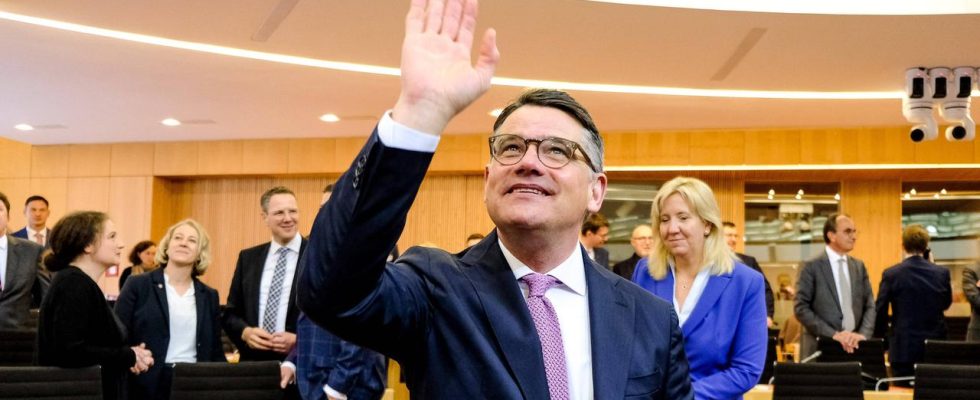The new black-red coalition in the Hessian state parliament has confirmed Boris Rhein as Prime Minister. The CDU politician received one more vote than the government camp has mandates.
Boris Rhein remains Prime Minister of Hesse. The new coalition of CDU and SPD elected the Union politician from Frankfurt on Thursday in the constituent session of the state parliament in Wiesbaden again.
The 52-year-old received 76 yes votes in the secret vote. The government camp has a total of 75 of the 133 mandates in the state parliament. 56 MPs voted no. 67 votes were needed for the majority.
First black-red coalition
Rhein came into office for the first time at the end of May 2022 in the then black-green coalition as the successor to Volker Bouffier.
The Hesse CDU with Rhine emerged as the clear winner in the state elections last October. She decided to end the ten-year coalition with the Greens and to create the first Union-led CDU/SPD coalition in the history of Hesse.
Wallmann re-elected as president
Astrid Wallmann was re-elected as President of the State Parliament. The 44-year-old from Wiesbaden, who took office in 2022, received broad support, with only the AfD abstaining. Wallmann invoked the value of liberal democracies. Trust in parties, politicians and the state in general has fallen. “Our democracy needs active democrats more than ever,” she demanded.
Wallmann’s deputies were Frank Lortz (CDU), Daniela Sommer (SPD), Angela Dorn (Greens) and René Rock (FDP). The AfD candidate Anna Nguyen was the only one to fail in three rounds of voting when the vice presidents were determined. This is disappointing, unfair and damaging to the reputation of Parliament, said Nguyen. The “self-proclaimed democratic parties” applied double standards.
Prime Minister promotes “new style”
After his re-election as head of government, Rhein thanked the citizens for a clear government mandate. At a time of great uncertainty, this also brings with it great responsibility. “The danger that these multiple crises will become a crisis of democracy and politics as a whole is not small,” said Rhein.
Many people have the feeling that democracy is not keeping its central promise of making politics for the majority. It is therefore a matter of regaining lost trust in democracy and showing that no other form of government is able to master the challenges of the time.
The re-elected Prime Minister, who was previously President of the State Parliament, promoted a “new style” to the MPs: Despite all the necessary struggles to find the best solution, the similarities between the Democrats must always remain visible. “No one represents the people alone,” emphasized Rhein.
Government statement follows
Rhein only addressed the government’s program in general terms. He will outline it in a government statement in the state parliament next week. When presenting the coalition agreement, the CDU politician announced a “progressive-pragmatic” policy. They want to tackle the problems of a broad majority and make the necessary changes carefully.
In the coalition agreement, which primarily bears the signature of the CDU, the key points are a strong state and a stable economy. Among other things, adherence to the debt brake is planned as well as a stricter asylum policy with more deportations.
There are also plans to expand the police’s search options through artificial intelligence and video surveillance. Investments in daycare centers, the expansion of all-day schools and the creation of affordable housing are planned. The CDU and SPD are also sticking to the constitutionally controversial goal of banning special gender symbols not only in schools and in public administration, but also in universities and on the radio.
SPD fought over ministerial posts
The new cabinet was appointed by Rhein on Thursday afternoon in the so-called blue cabinet room, before the new ministers took their oath of office in the plenary session of the state parliament. At the beginning of the week, the CDU and SPD had already presented the personnel details. The CDU accounts for eight out of eleven ministries. The SPD receives three departments.
There are only three politicians on the Union side who were already responsible in the last black-green state government. Two of them are taking over other departments: the previous Minister of Culture Alexander Lorz is now Finance Minister, his successor in the education department was the previous member of the Bundestag Armin Schwarz. Roman Poseck, previously Minister of Justice, takes over the Interior Ministry.
Kaweh Mansoori, a member of the Bundestag from Frankfurt, will take over the largest ministry for the SPD. He will also become deputy prime minister. The distribution of departments led to a heated debate within the SPD. The previous parliamentary group leader Günter Rudolph, one of the pioneers of the black-red coalition, was not given a position. He then no longer ran for parliamentary group chairmanship.
The SPD state chairwoman Nancy Faeser remains Federal Minister of the Interior in Berlin. As her party’s top candidate, she had already announced before the state elections that she would only return to Wiesbaden if she won and would be Prime Minister.
AfDSenior President criticizes the size of the state parliament
The constituent meeting was opened by AfD politician Bernd-Erich Vohl, the oldest of all MPs. The 73-year-old criticized the fact that parliament only started work more than 100 days after the state elections. A shorter distance could increase productivity.
As senior president, Vohl also suggested a cross-party agreement to limit the size of the state parliament in order to increase efficiency. It was very nice to be able to “welcome another 132 colleagues here, but the Hessian state parliament actually only consists of 110 members,” he said. The additional seats in parliament result from overhang and compensatory mandates.

